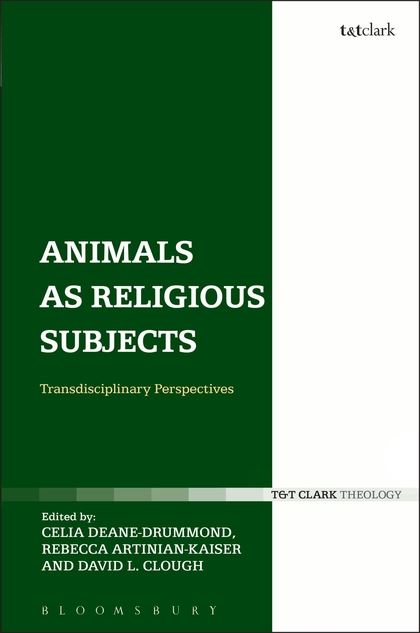Animals as Religious Subjects, reviewed by Stephen Vantassel
 Celia Deane-Drummond, Rebecca Artinian-Kaiser, and David L. Clough, eds., Animals as Religious Subjects: Transdisciplinary Perspectives (Oxford: Bloomsbury T & T Clark, 2013, 2014), vii+310 pages, ISBN 9780567659767.
Celia Deane-Drummond, Rebecca Artinian-Kaiser, and David L. Clough, eds., Animals as Religious Subjects: Transdisciplinary Perspectives (Oxford: Bloomsbury T & T Clark, 2013, 2014), vii+310 pages, ISBN 9780567659767.
This volume is an outgrowth of papers presented at the third biennial meeting of the European Forum for the Study of Religion and Environment at the University of Chester in May of 2011. It contains 13 articles by authors ranging from luminaries in the animal ethics field to graduate students.
The introduction, by Deane-Drummond and Clough, is a superb example of what an introduction should accomplish. It situates the text within the discipline of animal-theology, arguing that the book contributes to the discipline but also summarizes each of the articles thereby providing a complete overview of the book’s contents. Readers skip this introduction at their own peril.
The articles are organized under four main headings which will be discussed in turn. Part One, “Animals as Subjects of Religious Thought” contains three articles that seek to reorient us away from our superior attitude towards animals by asking us to reconsider our intellectual authorities, biases, and categories respectively. The first articles draws on pagan practice, poetry, and philosophy (p.25) to convince us to consider the possibility that animals may be more religious than Abrahamic religions have traditionally thought. The second article argues that our contemporary views on animals are biased by the impact of scientific empiricism and Reformational exegesis which separated us from the voices of the earth. The last article contends that we should not allow our thinking to be dominated by the animal-human binary categorization of the animal kingdom.
Part Two, “Animals as Subjects of Religious Symbolism” contains three articles on how animals were viewed by post apostolic Christians, medieval Germany, and Hindus. The fourth article is an interesting discussion on the symbolism of the praying mantis through the ages. This section is primarily of a historical and descriptive nature and can be useful for those interested in those subjects and periods.
Part Three, “Animals as Subjects of Theological Inquiry” contains three articles questioning the notion that the sharp distinction between animals and humans is as real and substantive as presently believed. The first article argues that our sense of place influences our perception of the place animals have in our world. The author asks us to reconsider our perspective in order to have a wider appreciation of the diverse life forms on the planet. The second article appeals to arguments made by Gregory of Nazianzus and Evagrius of Pontus suggesting that humans become like animals when we choose God because we lose our ability to choose. Thus rather than highlighting the distinction between animals and humans, it appears these theologians made an argument that could be used to reduce that gap. The final article in this section argues that our classification schemes reinforce human superiority over animals. The author suggests we should seek to celebrate animals rather than categorize them to reinforce their lower place.
Part Four, “Animals as Subjects of Religious Ethics” contains three articles. The first argues that Deuteronomy’s negative view of animals flows from the urbanized world-view of its author and that we should draw our perspective on animals from that proffered by Jonah instead (cf. Jon 4:11). The second article makes the interesting claim that transgenic research is wrong, not because it violates human dignity but because it can violate the dignity of the animals. The final article attempts to show that Aquinas thought that animals have their own status as being in the image of God, albeit at a different level, thereby overthrowing the historic view that Aquinas believed animals had a very low status.
Since my interests lie in the theological and ethical issues surrounding animals, I will focus my review on those chapters. On the one hand, the book does help readers see the place of animals in a different way. In that regard, the opportunity to reflect on the traditional Christian view that animals are subordinate to humans in status, ontology, and redemption is valuable. Likewise, the authors provide important conceptual schemes that should be considered when discussing animal-theology. On the other hand, articles appealing to scripture fail to properly consider the wealth of data that oppose their position. In addition, I found it ironic that the authors condemn the scientific view of the Enlightenment that humans are superior/different than animals while never considering the possibility that the modern evolutionary-scientific worldview holding that humans are just another animal is also an unjustified assumption.
Ultimately, the authors raise important questions and make thought provoking comments. But their failure to ground the arguments in concrete data make them little more than philosophical musings that require the reader to do a lot more work to arrive at a supportable conclusion. Apparently, it is easier to raise questions than to evaluate the evidence and arrive at a decision based on the preponderance of the data.
Reviewed by Stephen M. Vantassel
Publisher’s page: http://www.bloomsbury.com/us/animals-as-religious-subjects-9780567015648/
Preview: https://books.google.com/books?id=HZdLAQAAQBAJ
Category: In Depth, Summer 2016


